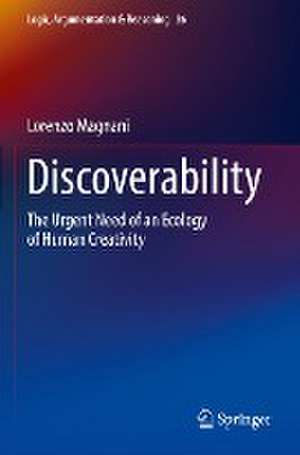Discoverability: The Urgent Need of an Ecology of Human Creativity: Logic, Argumentation & Reasoning, cartea 26
Autor Lorenzo Magnanien Limba Engleză Paperback – 21 mai 2023
Overall, this book fills an important gap in the literature on the nexus abduction – creativity – discovery, offering a source of inspiration to philosophers, epistemologists, and cognitive scientists. Yet, it also addresses researchers in other disciplines interested in the problems of scientific discovery and epistemic integrity of research.
| Toate formatele și edițiile | Preț | Express |
|---|---|---|
| Paperback (1) | 634.68 lei 43-57 zile | |
| Springer International Publishing – 21 mai 2023 | 634.68 lei 43-57 zile | |
| Hardback (1) | 640.71 lei 43-57 zile | |
| Springer International Publishing – 21 mai 2022 | 640.71 lei 43-57 zile |
Din seria Logic, Argumentation & Reasoning
- 8%
 Preț: 528.74 lei
Preț: 528.74 lei - 20%
 Preț: 580.84 lei
Preț: 580.84 lei - 15%
 Preț: 650.19 lei
Preț: 650.19 lei - 20%
 Preț: 524.13 lei
Preț: 524.13 lei - 15%
 Preț: 643.48 lei
Preț: 643.48 lei - 18%
 Preț: 723.06 lei
Preț: 723.06 lei -
 Preț: 394.12 lei
Preț: 394.12 lei - 15%
 Preț: 695.53 lei
Preț: 695.53 lei - 15%
 Preț: 643.34 lei
Preț: 643.34 lei - 20%
 Preț: 513.15 lei
Preț: 513.15 lei -
 Preț: 398.92 lei
Preț: 398.92 lei -
 Preț: 387.96 lei
Preț: 387.96 lei - 15%
 Preț: 643.34 lei
Preț: 643.34 lei - 15%
 Preț: 490.93 lei
Preț: 490.93 lei - 18%
 Preț: 726.23 lei
Preț: 726.23 lei - 18%
 Preț: 733.78 lei
Preț: 733.78 lei - 18%
 Preț: 895.56 lei
Preț: 895.56 lei - 15%
 Preț: 696.02 lei
Preț: 696.02 lei -
 Preț: 354.54 lei
Preț: 354.54 lei - 18%
 Preț: 723.38 lei
Preț: 723.38 lei - 18%
 Preț: 723.56 lei
Preț: 723.56 lei - 24%
 Preț: 801.70 lei
Preț: 801.70 lei - 15%
 Preț: 634.49 lei
Preț: 634.49 lei - 18%
 Preț: 728.43 lei
Preț: 728.43 lei - 18%
 Preț: 789.98 lei
Preț: 789.98 lei - 18%
 Preț: 787.78 lei
Preț: 787.78 lei - 18%
 Preț: 918.30 lei
Preț: 918.30 lei - 15%
 Preț: 657.25 lei
Preț: 657.25 lei -
 Preț: 397.16 lei
Preț: 397.16 lei -
 Preț: 392.97 lei
Preț: 392.97 lei
Preț: 634.68 lei
Preț vechi: 746.69 lei
-15% Nou
Puncte Express: 952
Preț estimativ în valută:
121.48€ • 132.00$ • 102.11£
121.48€ • 132.00$ • 102.11£
Carte tipărită la comandă
Livrare economică 21 aprilie-05 mai
Preluare comenzi: 021 569.72.76
Specificații
ISBN-13: 9783030933319
ISBN-10: 3030933318
Pagini: 156
Ilustrații: XIX, 156 p. 1 illus.
Dimensiuni: 155 x 235 mm
Greutate: 0.26 kg
Ediția:1st ed. 2022
Editura: Springer International Publishing
Colecția Springer
Seria Logic, Argumentation & Reasoning
Locul publicării:Cham, Switzerland
ISBN-10: 3030933318
Pagini: 156
Ilustrații: XIX, 156 p. 1 illus.
Dimensiuni: 155 x 235 mm
Greutate: 0.26 kg
Ediția:1st ed. 2022
Editura: Springer International Publishing
Colecția Springer
Seria Logic, Argumentation & Reasoning
Locul publicării:Cham, Switzerland
Cuprins
1. Discoverability Explained: Optimizing the Eco-Cognitive Situatedness.- 2. Curing Eco-Cognitive Situatedness: Diagnosticability, Affordances, Abduction.- 3. Eco-Cognitive Openness and Eco-Cognitive Closure: Locking or Unlocking Strategies? “Knowledge in Motion” Defended.- 4. Jeopardizing Discoverability Epistemic Irresponsibility: Human Creative Abduction Attacked.- 5. The Future of Eco-Cognitive Settings Computationally or Humanly Tailored?.- Conclusion.
Notă biografică
Lorenzo Magnani, philosopher, epistemologist, and cognitive scientist, is a professor of Philosophy of Science at the University of Pavia, Italy, and the director of its Computational Philosophy Laboratory. Authors and editor of many books and proceedings and of about 400 publications in 2015 has been appointed member of the International Academy for the Philosophy of the Sciences (AIPS). He is the editor of the Book Series Studies in Applied Philosophy, Epistemology and Rational Ethics (SAPERE), Springer, Switzerland.
Textul de pe ultima copertă
The book analyses the concept of discoverability, and some current epistemological problems related to it, with a special attention to science. It shows that discoverability is closely related to the sustainability of human creativity in an "eco-cognitive" perspective. Advocating the need of an integral ecology and leveraging the important concept of abduction, it demonstrates that an ecology of human creativity should have priority over other needs, i.e that the first ecological duty is to protect and sustain discoverability. Enhancing discoverability will protect human creativity, and it is exactly human creativity, a form of innovative abductive cognition, that can promote the implementation of the other kinds of ecology. The author guides readers through a comprehensive discussion on the concept of discoverability, eco-cognitive situatedness, and eco-cognitive openness and closure alike. By describing some key real-world examples, he highlights the main challenges that are currently posed to human creativity and epistemic integrity. He also describes future eco-cognitive settings, discussing the problem of overcomputationalism and suggesting a reinterpretation of the role of human knowledge.
Overall, this book fills an important gap in the literature on the nexus abduction – creativity – discovery, offering a source of inspiration to philosophers, epistemologists, and cognitive scientists. Yet, it also addresses researchers in other disciplines interested in the problems of scientific discovery and epistemic integrity of research.
Overall, this book fills an important gap in the literature on the nexus abduction – creativity – discovery, offering a source of inspiration to philosophers, epistemologists, and cognitive scientists. Yet, it also addresses researchers in other disciplines interested in the problems of scientific discovery and epistemic integrity of research.
Caracteristici
Offers an unconventional approach to protecting human creativity Promotes the ecology of human creativity Presents discoverability as the condition of enhancing human creativity
